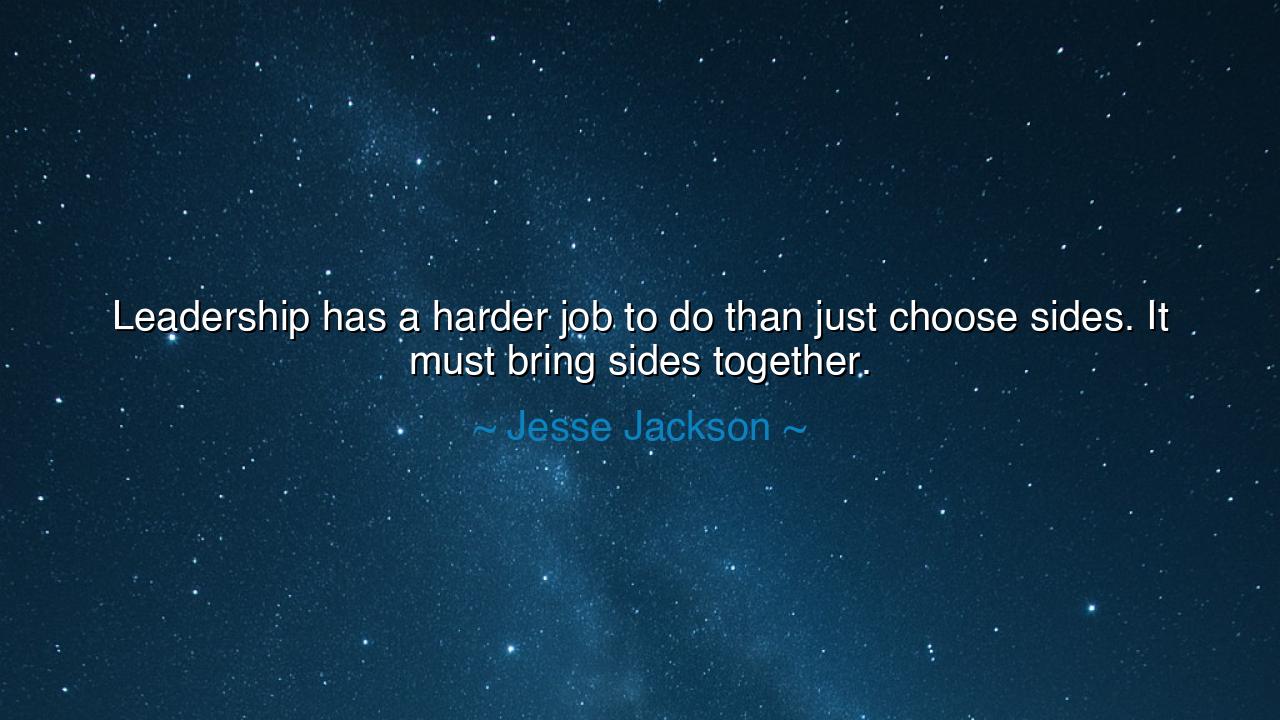
Leadership has a harder job to do than just choose sides. It must
Leadership has a harder job to do than just choose sides. It must bring sides together.






"Leadership has a harder job to do than just choose sides. It must bring sides together." Thus spoke Jesse Jackson, preacher, activist, and tireless advocate for justice, whose voice rose in the struggles of civil rights and echoed in the halls of power. His words remind us that true leadership is not a matter of division, of pointing and choosing, of declaring loyalty to one side against another. Rather, it is the far greater and more difficult work of reconciliation—of finding common ground, of uniting people who see the world differently, and of weaving the torn fabric of a community back into one garment.
The meaning of this saying is clear. To choose sides is easy; any man can do it. It requires no vision to declare who is right and who is wrong, no courage to raise a banner in one camp or the other. But to bring sides together requires wisdom, patience, and sacrifice. It demands listening to the grievances of both, understanding the fears of each, and holding steady when storms of anger threaten to sweep all away. Leadership, then, is not about feeding conflict but about healing it—not about division but about unity.
History gives us many mirrors of this truth. Consider the work of Abraham Lincoln at the time of America’s Civil War. He could easily have declared himself only the champion of one side, content to crush the other. Yet in his speeches and letters, he looked always toward reunion, toward "binding up the nation’s wounds," toward bringing together North and South, slave and free, into one Union renewed. It was this vision of bringing sides together, not merely choosing one, that gave his leadership enduring greatness.
Or reflect upon Nelson Mandela, who, after decades in prison, emerged not with vengeance in his heart but with reconciliation on his lips. South Africa was torn between oppressors and oppressed, yet Mandela’s greatness lay in his refusal to deepen division. He could have chosen sides with ease, yet he sought to bring sides together, to forge a nation where forgiveness was possible and where healing could begin. His leadership reminds us of Jackson’s wisdom: the harder path is the higher path, and the true leader is a bridge, not a wall.
Yet Jesse Jackson’s words are also a warning for all who would lead in smaller matters of daily life. In our families, in our workplaces, in our communities, conflicts arise. It is tempting to choose sides, to defend those we favor and dismiss those we do not. But this creates only bitterness and division. True leadership in these moments means rising above preference and pride, and working to bring people together. For unity multiplies strength, while division weakens all.
The lesson is plain: a true leader must see beyond the battlefield of sides. They must fix their eyes upon the horizon of unity, even when both sides cry out for loyalty. They must endure criticism from both camps, for neither will be fully satisfied. And yet, if they succeed, they will leave behind not a legacy of factions but a legacy of harmony, one that endures long after conflict fades.
Practical action follows. If you are entrusted with leadership, listen deeply before you judge. Do not seek only to win arguments, but to build bridges. Where others cry for vengeance, speak for reconciliation. Where others deepen wounds, strive to heal them. Even in your daily life, practice this art: in disputes among friends, in conflicts at work, in quarrels at home. Ask not, "Which side will I choose?" but rather, "How can I bring sides together?" For in this lies the higher calling of leadership.
So I say to you, children of tomorrow: remember the wisdom of Jesse Jackson. To choose sides is simple; to unite them is divine. Let your leadership be not the sword that cuts, but the hand that binds; not the fire that consumes, but the light that guides. For the world is full of divisions, but the true leader, rare and precious, is the one who makes of many, one.






AAdministratorAdministrator
Welcome, honored guests. Please leave a comment, we will respond soon